'India is no longer the India of the '70s and the '80s.'
'It's a large country with the fastest growing economy.'
'In working with India, you just can't go and humiliate the nation publicly.'
USIBC President Mukesh Aghi tells Aziz Haniffa/Rediff.com about how he advises American companies to do business with India, what he thinks of Modi's government and the way forward for the India-US relationship.
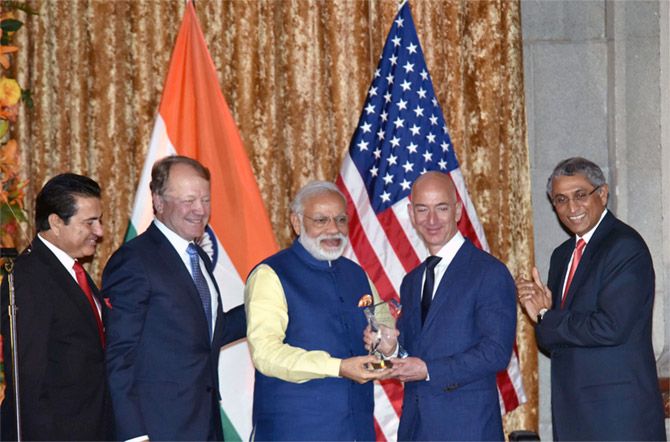
For Dr Mukesh Aghi, president of the US-India Business Council, Prime Minister Narendra Modi's address to a joint session of Congress on June 8 had a special significance because in the mid-1980s, when he first came to Washington, DC, to work as a Congressional staffer on Capitol Hill, he was witness to then Indian prime minister Rajiv Gandhi's address on July 13, 1985, which set the tone for a transformed US-India relationship after the demise of the Cold War.
Dr Aghi, immediately after he completed his PhD in international relations at the Claremont Graduate University in California, came to Washington to work for then US Congressman Meryvn M Dymally, a member of the House Foreign Affairs Committee.
He also enjoyed a short stint with then Speaker of the US House of Representatives 'Tip' O'Neill. This was after he had received an advanced management diploma from the Harvard Business School, an MBA in international marketing from Andrews University, Michigan, and a BA in business administration from the Middle East College, Beirut, Lebanon.
In an interview with Aziz Haniffa/Rediff.com, Dr Aghi said that buoyed by his PhD in international relations and despite all of his business degrees, he had come to Washington "to make a difference in the world."
Asked why he left Washington and the politics of Capitol Hill, Dr Aghi said, "I came to DC as a naive, young student, fresh after his PhD, who wanted to change the world."
"But when you come to DC, you realise that things are so entrenched, you can't change it," he said, and added, "The question then is, do you become part of that or do you say, 'I don't want to be part of that.' And I decided, I don't want to be part of that and I moved to the private sector and for the next 20, 25 years, just focused on creating wealth, creating jobs, and traveled across the world, living in Japan, in France, Delhi, Singapore, London."
"It was a great experience," Dr Aghi said, "and so what I bring to the table is the efficiency of a corporate world, understanding of an international environment, and a network of relationships in India and the US."
"I've come back a little more mature, a little more wiser, to make the change, and hopefully a difference," Dr Aghi added.
Before assuming the presidency of the USIBC, he was chief executive and member of the board at Larsen & Toubro Infotech. Earlier, he served at Steria, Inc, India, as its CEO, Asia Pacific and Global Executive Sales Director.
At Steria, he was responsible for India's top 50 global accounts with revenues exceeding $1.5 billion and was the catalyst behind its successful merger with Xansa creating a multi-billion dollar services business.
Dr Aghi was also associated with Universitas 21 Global, the world's largest consortium of research-led universities and a global leader in providing post-graduate online education. He was also president of IBM India, Ariba, Inc, J D Edwards and Co, among others.
Fluent in several languages, Dr Aghi was recognised by Esquire magazine as a Global Leader and has won numerous awards and accolades, including the J R D Tata Leadership Award.
An avid marathon and mountaineer he has completed over 22 international marathons and climbed some of the highest peaks in North America and Europe.
You've just completed one year. How has the run been so far?
What has been most fulfilling and what have been the major challenges?
I am excited to be at the helm of the USIBC, the premier business organization in the US of Fortune 500 companies and other companies, including small and medium enterprises across a wide range of areas doing business in and with India, particularly at this time when we are seeing an accelerated momentum taking place between India and the US in the global environment, which is shifting very fast, especially with the rise of China as an economic and military power.
We have been able to define a vision as to where we want this relationship to go in the next 10 to 15 years.
And that is defined in terms of trade, defined in terms of geo-political aspects and also cultural aspects.
I believe from a USIBC perspective, it's been an exciting year for me.
You replaced Ron Somers, who was president of USIBC for over 10 years and your personalities couldn't be more different.
Ron was this garrulous, irrepressible, quintessential Indiaphile, who had lived and worked in India for several years and who was known to punctuate his welcoming and introductory speeches and even his remarks when on the business circuit around the country with a surfeit of Hindi phrases and couplets, etc.
You are pretty low-key, but you've had this amazing career in technology, you've turned around sick companies, developed companies, taken them public and so on.
What was it about the USIBC that made you accept this new avatar?
You reach a stage in life when you say, OK, what else can you do, what else can you be remembered for.
I believe I've chased enough money and taken companies to IPOs (initial public offerings) to market values of $40 plus billion.
Immediately after my stint on Capitol Hill, when I got into business, it was to turn around a sick company and make it highly profitable and take it for an IPO.
So the key thing about what I like about this position is that you are trying to make a difference.
When you say you are trying to make a difference, in this instance it is to specially help a country like India, where you have a young population but is not able to provide them jobs, which then makes the demographic dividend not an asset, but a liability.
Now, we have 10 years to fix that.
Today, the median age in India is 25 years and you have a million people coming to the job front every month.
You have a pool of 47 million Indians who are looking for jobs at the moment and the current job creation is 1.6 percent and that means 6 percent is added to the pool every year.
I believe geo-politically the US needs a partner in Asia and India becomes the right partner, being that it's a living, breathing, resilient and vibrant democracy with our values, rule of law, an independent judiciary and so on.
At the time you took over the reins of the USIBC, the Modi government was into its first year. Did you believe that taking over the leadership of the USIBC at that particular time, besides the timing itself, offered you a good fit?
Absolutely. I firmly believe the stars are aligned in our relationship, both in Delhi and in Washington.
They are aligned because you have the right leadership on both sides. They are aligned because there is a need of dependency on these two nations, geopolitically, economically and technologically.
I felt the USIBC is the perfect platform from where one could drive this ultimate objective to foster not only a better relationship, but create more jobs for both countries.
I strongly believe that if the India-US relationship reaches a new level, India as a confident nation will support the rest of South Asia and Asia itself.
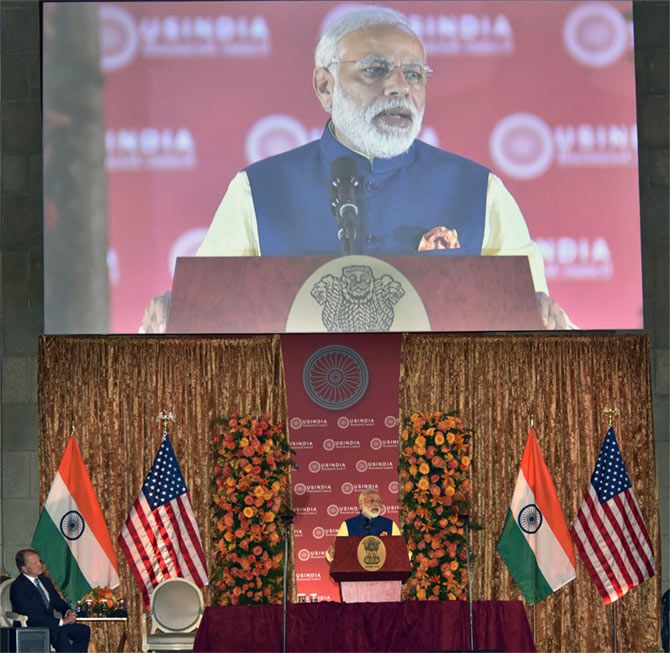
As you reflect on the past two years of Prime Minister Modi's administration, now as the head of the advocacy arm of America Inc, doing business in and with India, what are some of the tangibles you can point to in terms of what his government has done to fulfil some of the priorities of the USIBC agenda?
If you look at it economically, what we are seeing is, he has brought inflation down below 5 percent.
He has built up confidence so much so that FDI (foreign direct investment) flows into India is up by over 40 percent, while globally it is down by 16 percent.
He has brought a sense of transparency -- the whole spectrum auction, the whole coal auction. There is not been an iota of finger-pointing or corruption.
In term of the ease of doing business, he is making things better -- we are still not there, but he's making things better.
Meanwhile, he's gone out and raised the profile of India in terms of a global leadership perspective and that has sent a strong message.
Strictly, from a USIBC perspective, the economic agenda has played well. Of course, we still have a way to go, but the confidence level of the USIBC membership is up.
Last year, our member companies invested $15 billion in India, and going forward, we have already seen the number jumping up to $27 billion.
So the sentiment is positive, but the expectations are also very high with this prime minister.
When you said we've still got a way to go, particularly since the expectations of Prime Minister Modi are so high.
In this regard, what have been the major disappointments, because clearly there are quite a few considering the euphoria and the high that followed in the aftermath of the massive mandate Modi and his party, the Bharatiya Janata Party, received?
If there are disappointments, I wish he was able to coalesce the Opposition to pass the Labour Reform Bill, the Land Bill, GST.
I believe that somehow the Opposition, such as the Congress, with only 40 members in the Lok Sabha and with not even 10 percent, were able to derail the entire legislative side.
I believe that could have been managed better. But on overall relationship, on the overall leadership, he has been phenomenal.
One of the things that economic gurus like Fred Bergstein, president emeritus of the Peterson Institute, former ambassador to India and USIBC godfather Frank Wisner, and the likes of Senator Mark Warner, co-chair of the Senate India Caucus, have been urging has been the enactment of a BIT (bilateral investment treaty), which they believe could ultimately even be a precursor or stepping stone for a FTA (Free Trade Agreement).
Why has it been so difficult to nail it down because both sides have been talking about it for years, but have still not been able to get to first base?
Both are far apart on their thinking. The US would like to see a certain amount of labour rights in BIT, which India cannot agree to or accept -- there are liability issues.
India needs to first get its court system more efficient to deal with these -- and I would say the gap is too wide at this stage to move this thing forward.
So, at the moment, I don't see they are together on this.
The other thing you got to understand is what are the priorities for the US? At the moment, the USTR (United States Trade Representative) is focused a lot on a US-China BIT and if they compromise on India, it has an impact on the China discussions.
So, the objective is to close the China BIT and leave the India part to the next administration.
We at the Council, of course, are very keen to have some kind of an investment treaty because it gives a much more sense of confidence and comfort to our member companies as they contemplate investing in India because then they have a process that is defined if there is any dispute.
And a lack of that, they end up going through Singapore or Mauritius, and so, BIT is very important for this trade relationship to move forward.
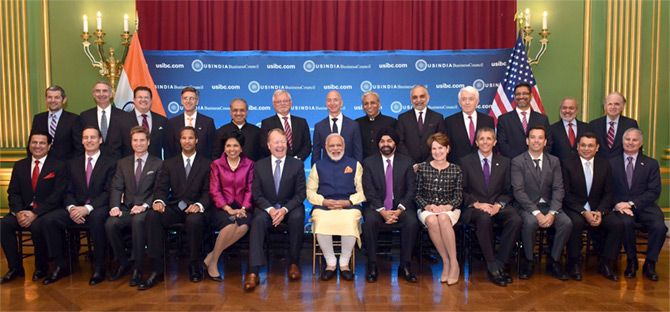
Your parent body, the US Chamber of Commerce, and other powerful industrial and manufacturing organisations like NAM (National Association of Manufacturers) keep hammering away at India's slow pace of reforms, lack of intellectual property protection.
How do you counsel them, because surely you can't keep telling them ad infinitum to exercise patience, which is a constant refrain by India to the US?
First, you got to understand that India is no longer the India of the '70s and the '80s.
It's a large country and now with a major economy, which is growing very fast -- it is the fastest growing economy.
And so, you can't basically stand on a podium and preach to India. You got to go and sit down and discuss the issues and so, the counsel to all of them is, don't go out and preach or dictate, have discussions and try to take it forward.
So, that's what we do. The USIBC -- when we have disagreements with the Government of India -- we do it quietly and tell them what to do and they listen to us.
We've now become a trusted partner for the Government of India. We may disagree, but we will not disagree in public, we'll do it privately.
In working with India, you just can't go and humiliate the nation publicly.
For example, in the case of my 301 testimony, that's the approach we took.
If you look at this government, it has not used any compulsory licensing since it came to power. We are waiting for the new IPR policy to come out and hopefully, things should turn around.
In terms of services, some leading members of Congress like Senators Charles Grassley and Richard Durbin have been going after Indian IT companies, alleging visa fraud in terms of H-1Bs and L-1s.
Congress' recent action in hiking the fees for H-1Bs has caused heartburn among Indian IT companies. How do you counter that? And in the case of the latter, is the horse already out of the barn?
Our position is that the raising of the H-1B fees is discriminatory. You can't on one side preach about open trade and on the services side, which is India's strength, put discriminatory policies. That's wrong.
We are trying to work with the administration, with Congress, to see how we can find the right balance, because it has an impact of roughly up to $400 million a year for Indian IT companies.
To answer the first part of your question about fraud regarding H-1B, L-1s, I think there will always be issues there -- some companies are clean while others are not clean.
You recently saw in your newspaper how half a dozen people got indicted on H-1B fraud, and that too in Silicon Valley. So, you'll always have aberrations, but overall the trend is to obey the laws and move on.
The USIBC has always had some powerful, high-priced lobbyists working for you guys, particularly on Capitol Hill.
You are an old Congressional hand, so, how did you miss the H-1B visa fee hike being snuck into the overall authorization bill and being pushed through?
We all got caught by surprise because it was part of the Omnibus bill and we only had five days notice. As soon as we came to know of it, we mounted our troops to go fight this thing, but it was too late.
When we reached across the street to the White House -- because it was part of the whole bill -- they said there is nothing that could be done because it would be discriminatory and the President can't veto that part of it.
So, it was a case of it just being slipped in. Hopefully, the next time we won't be caught off guard here.
The Department of Justice, just a couple of weeks ago, said that in March, the US had a trade deficit with India of $1.7 billion, compared to the trade deficit with China, which was $26 billion.
How do you convince India for a more level playing field in terms of buying more of US goods, products, services, etc, particularly in a very toxic political environment as it is today with Donald Trump and even Bernie Sanders hammering away at these issues of massive trade deficits, outsourcing and the like?
Even though the bulk of the attacks are directed against China, Trump hasn't spared India either.
If you look at it, overall India has a trade deficit combined in its trading environment as compared to China. That's one.
Yes, a couple of months ago, India had a trade surplus with the US, but if you look at the last five years, it always had one.
But India has become the largest purchaser of US defence equipment and that is creating more jobs in the US, India buys a lot of technologies, particularly on the agricultural side from the US, and so, my feeling is that as you go forward, you will see either equal or the US having a trade surplus with India, unlike China.
$1.7 billion is nothing compared to an economy, which is over $20 trillion, and so, I don't believe that has much implication.
Have you been strategising for either a Hillary Clinton or a Trump administration considering their perceived anti-trade declarations?
Even Hillary has been moving to the left on trade from everything ranging from TPP to outsourcing, etc, especially since Bernie Sanders has been going after her on this.
His campaign has even put out stuff about Hillary talking about outsourcing to India being inevitable during a trip there several years ago.
And, of course, all of us know about how Trump has been almost visceral on this issue of outsourcing, even mocking Indian call-centre workers, etc.
Has there been any behind-the-scenes strategising and preparation on how to react and to deal with either a Hillary or Trump administration?
We are agnostic as to who comes in, and we want to be more focused on three broad principles.
One is, definitely on the economic side. The US has tremendous capital and it has fantastic technology and India needs both.
India provides a massive market for American companies from the infrastructure perspective to digital technology to innovation and in defense, co-production and co-development and we believe Prime Minister Modi's Make in India is one avenue.
So, it's a win-win scenario from that perspective.
The second is geo-political. Regardless of who comes in, India will play a balancing role in the Asia Pacific region and that's very important for India, but very much for the US also -- that's a no-brainer.
And third is the cultural aspect. India is shipping 120,000 students into the US every year, we have almost 70,000 to 80,000 IT workers on the H-1B programme and the values, the openness and Indian being law-abiding citizens itself plays in a non-threatening way into the American consciousness.
So, if you just focus on those three broad areas, regardless of who comes in, this relationship will move forward.
How gung-ho are you on the exponential growth of the US-India defence trade and cooperation?
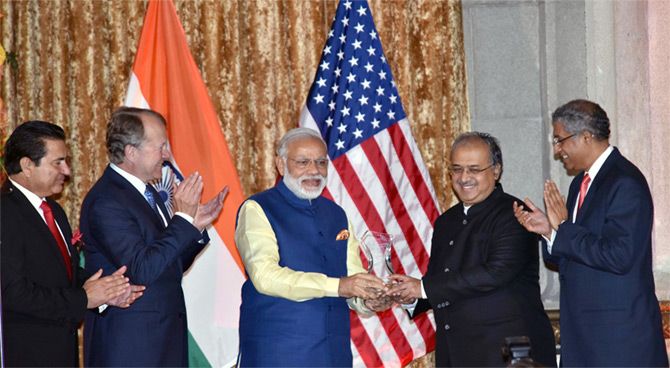
I remember 10 years ago, today's figure of well over $15 billion would have been unthinkable because then it was zero.
Is this particular relationship going to be the anchor and the key driver of future US-India trade ties?
Or are you optimistic that it will be a broader relationship incorporating all areas of trade and commerce despite the continuing challenges and hiccups?
I strongly believe that when nations have a common challenge, including security from combating and countering terrorism and extremism to cyber-security, they align better.
If you look at the defence side, last year, there were 54 joint military exercises between India and the US. You have a rapid reaction team at the Pentagon and the only country that has it is India itself.
So, I believe that the relationship will deepen further and it is not just by purchasing equipment. The way I envision it, will be by transfer of technology and India building those products for the US and NATO allies at one-fifth the cost and thereby bringing down the costs of federal expenditure on the defense side much lower -- just like generic drugs of which India has 37 percent of the market, bringing almost $20 billion in savings to the federal government.
You can envision the same kind of scenario on the defence side and so, it's definitely going to be a win-win partnership.









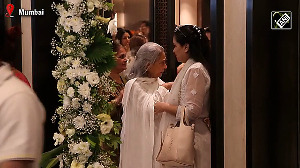

 © 2025
© 2025